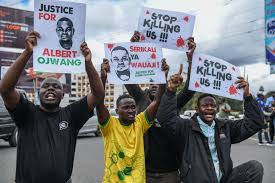What started as a tragic loss has now erupted into a national crisis in Kenya.
The death of a popular TikTok activist, Albert Omondi Ojwang, while in police custody earlier this month, has triggered an outpouring of anger, protests, and calls for justice across the country.
Ojwang, a former schoolteacher turned online whistleblower, wasn’t just another social media personality—he was a bold voice against corruption.
But his sudden death has left more questions than answers, and many Kenyans believe they already know the truth: that he was silenced.
From Teacher to Viral Truth Teller
Albert Ojwang, 31, once taught Kiswahili and religious studies at Moi Boys High School in Voi, a town in southern Kenya.
But in recent years, he shifted his focus to exposing police misconduct on platforms like TikTok and X (formerly Twitter).
His content frequently revealed alleged bribery, unlawful arrests, and other abuses by traffic officers.
But things escalated on June 6, when he went live and publicly named several top-ranking officials—among them Officer James Mukhwana, Station Chief Samson Talaam, and Deputy Inspector-General Eliud Lagat—as key figures in what he called a “mafia-style” police extortion ring.
Hours after the broadcast, Ojwang was picked up by authorities—without a warrant, and without explanation.
A Death That Raised Suspicion
Police initially claimed that Ojwang had taken his own life, reportedly by slamming his head against a wall while in custody.
But that version quickly fell apart.
Government pathologist Dr. Bernard Midia conducted an autopsy and strongly refuted the suicide claim.
Instead, he reported signs of brutal physical assault, including soft tissue injuries, signs of neck compression, and blunt force trauma to the skull.
These were injuries consistent with a violent attack, not self-harm.
The Hashtag That Sparked a Movement
Soon after Ojwang’s death, the hashtag #JusticeForOjwang began trending across Kenya.
TikTok and X became digital battlegrounds, flooded with outrage, demands for accountability, and clips of Ojwang’s final broadcasts.
By June 25, nationwide protests had erupted—particularly in Nairobi and Mombasa—as thousands took to the streets.
Sadly, peaceful demonstrations were soon marred by chaos.
Violence, Looting, and Lives Lost
The unrest turned deadly. As of June 26, Amnesty International Kenya confirmed at least 16 people had been killed, many of them from gunshot wounds.
The Kenya National Commission on Human Rights (KNCHR) backed these findings, citing witness accounts and hospital data.
In the heart of Nairobi’s business district, flames engulfed multiple buildings, and local traders reported millions of shillings in damages.
Shops were looted, windows smashed, and livelihoods destroyed.
Officers Charged but Public Trust Still Wavers
On June 23, a breakthrough came: the Director of Public Prosecutions, Renson M. Ingonga, charged Station Chief Samson Talaam, two other police officers, and three civilians with murder over Ojwang’s death.
But many Kenyans remain skeptical.
They’ve seen these promises of justice before—only to watch them disappear in silence.
Adding fuel to the fire, Kenya’s Interior Cabinet Secretary, Kipchumba Murkomen, dismissed the protests as “terrorism disguised as dissent,” sparking even more criticism.
International Pressure Mounts
The tragedy has now drawn global attention.
Western embassies and the United Nations have voiced alarm over the violence and loss of life, urging the Kenyan government to uphold human rights and ensure accountability.
Their message is clear: the world is watching.
Will Justice Truly Be Served?
The death of Albert Omondi Ojwang has shaken the nation to its core.
With at least 16 more lives lost in the aftermath, the calls for justice are louder than ever.
But the big question remains: will those responsible be held accountable, or will this be yet another case where the truth is buried along with the victim?
